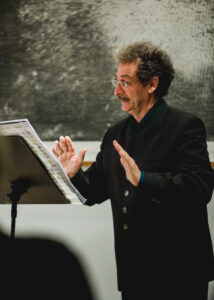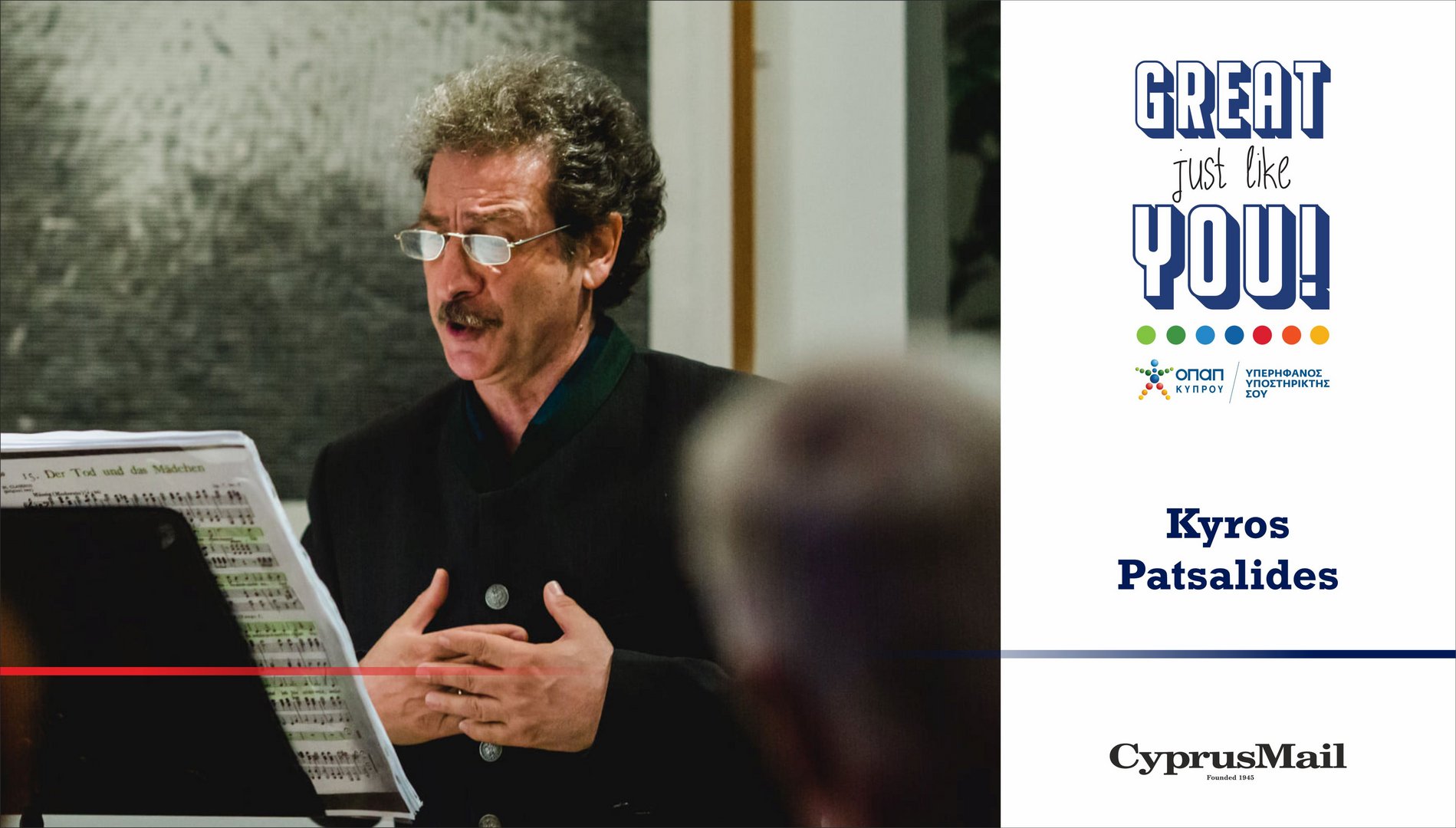OPAP Cyprus has provided the younger generation the chance to speak with local role models face-to-face, to chat to them, ask them questions, and to learn from their efforts and route to success through its new creative campaign, ‘GREAT. Just Like You’
One of the most internationally acclaimed Cypriot artists, baritone Kyros Patsalides has represented Cyprus in various international events with great success and earned enthusiastic praise by international critics. He has been honoured for his contribution to the musical life in Cyprus
Did your parents encourage you to take up music? And what about your teachers?
“My parents were a little hesitant about me becoming a musician at first, because in those years circumstances were very difficult. I think that the new generation has a great deal of advantages when it comes to music, including education and the infrastructures that are in place. Back in those days, we had few chances to sing, or even to study classical music and, by extension, to study as lyrical artists. The problem was that it was also the post-war period after the 1974 invasion, and we had to choose, along with music, another profession in another field of studies. I chose to study law at the Athens Law School, knowing that it would offer security. At the time, with a music background, we did not know what the future would hold.
In Cyprus it was difficult to come and, say, set up an orchestra – there were none at the time, not even a theatre, apart from the Nicosia municipal theatre – so it was hard for a young person to pursue music. I could understand my parents for having concerns. Thankfully, my music teachers intervened.

I graduated from Acropolis lyceum. It was there where I started my first performances as a solo artist. With the help of my teachers, I began singing, and took part in the high school’s choir. Later, I received a scholarship from the parents’ association to study phonetics with Ivi-Fox Kyriakidou – a mezzo soprano who was a Cypriot and lived here in Cyprus – at the Athens Conservatory where I began to study music along with my law studies. My teachers noticed my vocal capabilities, and my talent, which resulted in me receiving the scholarship. Teachers were also educators – and that, in my opinion, is very important.”
Is your typical day filled with music?
“My entire life is filled with music. I have often felt that music is God’s footprint on earth. I listen to many types of music, studying the sounds, and for relaxation. I always listen to at least one song a day. My mood often depends on music, a good tune can brighten up the day. For us musicians especially, music is essential, it is our oxygen. Personally, I cannot live without it.”
How difficult is it for someone to have an international career? What were some of the main difficulties you faced?
“I do not look at it as a career. I think for me it was about the opportunities that came up. When I left Cyprus and went to Greece – where I also joined the Athens Opera – I thought I knew everything at the time, however in Athens I realised I knew nothing. But later in Vienna, where my international career got underway, I hit the reset button. I understood that I did not know anything, even as a professional singer with the Athens Opera. It was hard for young artists to make their mark in a space like Vienna, Italy, Spain or Germany because the singers at that time were the generation after Callas, Pavarotti, Domingo, Carreras. However, what allows one to establish himself to become better, but not perfect – I do not think there is such a thing – is work, work, work. And not to allow one’s ego to overshadow the process – you should not believe that you know it all. Pride before the fall, as they say.
You must remain humble, consistent, until you reach that point where you consider that this is the job that you are going to pursue. That you are accepted in places beyond your own country. However, you should never turn your back on your country. Back then, things were very different – we did not even know if there was an audition somewhere, we would find out by chance. Today you push a button and get access to all the information.
For example, I recall a moment when I was talking with a Mexican friend, a tenor, and he mentioned about an opera competition for Donizetti’s L’elisir d’amore in Budapest. She encouraged me to go to the audition. I did not know anything, who was on the committee; I opened the door, and to my surprise, the great soprano Joan Sutherland and her husband Richard Bonynge, the biggest conductor in the world, Gianfranco de Pozio, the director of the Verona Arena were seated before me. And after I won that competition, I received contracts to perform in Verona, Italy and at the Budapest Opera.”

What would you advise children who will read this interview?
“I would like to advise children who are into music that the way Cyprus is now, the music culture here, the symphonic orchestras for the youth, the performers – they should always be united and look out for each other. Because that is how you will move forward in life but also within the music space. And the state should support the children in their musical endeavours. Children need to feel that there is a serious chance and prospect to make musical culture in Cyprus better.”
What do you do before an important performance?
“The first thing I do is prepare. For example, when preparing for an opera, we absolutely must know by heart the foreign-language text – Italian, French, German, Russian or English – and we should know the musical score and be consistent in all the parts. We should know our own part in the piece, as well as the parts of the others, to be ready when the on-stage rehearsals take place, to fulfil the role they have entrusted to us.
On the day of the performance, and even two to three days before, I try to speak as little as possible, because I have to ‘protect’ my voice. I also like to take a walk, half an hour before the performance, to breathe, and, of course, follow a good diet. I like to eat spaghetti with grilled chicken on the side. Before I get on the stage, I pray that all will go well.”
Which musician had an influence on you at the start of your career?
“Giuseppe Verdi. Before that, it was Wolfgang Amadeus Mozart, but Verdi really had an influence on me. Because his music, his works, and the fact that he, at the time, was a musician who was a revolutionary who wanted to help his homeland that was enslaved to free itself. Later, my repertoire included a great deal of Verdi, and Mozart when I performed for the Vienna Orchestra. But Verdi was mostly why I fell in love with music. In fact, my first cassette – we did not have CDs back then – that my aunt gave me was Verdi’s La Traviata, with Joan Sutherland, Manu Guerra and Pavarotti – whom I was later privileged to meet personally.”
What was the biggest challenge in your career?
“The biggest challenge was to make my mark among many who were my equals or even better than me. Another difficulty was leaving Cyprus and going overseas – Greece, Austria, Germany. There is of course the language barrier, but also at the time there were many who were far better than us. But this also drove us to improve, and to reach their level. I also had to travel great distances, and that cost money. However, it is good to get outside my comfort zone.”
Which artists do you admire?
“I admire those who have moral fibre and who do what is best for music. One artist I have a lot of respect for, is Alexia Vassiliou, among other Cypriot artists. I also admire Andrea Bocelli. He has a divine voice. I heard him perform while at Bologna and Modena where I studied with Pavarotti’s tutor Arrigo Pola. It was 1993 when Bocelli came in second at the Monte Carlo competition. It was very emotional to see Bocelli, a blind person, get up on stage and sing. As far as pop music goes, I always liked the Bee Gees and the Beatles. As for jazz, I like Cicoria whom I listened to at a concert in Vienna.”
What advice do you have for the members of the Youth Symphonic Orchestra?
“My experience with the Youth Symphonic Orchestra over the past six years was beautiful. I feel particularly blessed because these children, under the guidance of their conductor Mr. Kountouris, internalise what they are being taught. They are doing some great work. My advice to them is to stay the way they are, on good terms with one another, listen to their conductor, listen to their worthy teachers. They are like musical angels and ambassadors for Cyprus overseas.
Keep your passion, your love for music, and you are making a great deal of sacrifices, and I congratulate you for it. I would like to thank them for coming to Vienna every year, including the ministry, as well as OPAP Cyprus for supporting this effort.”
Watch the interview on Cyprus Mail’s YouTube Channel: https://youtu.be/DgUIXCw5dO8







Click here to change your cookie preferences